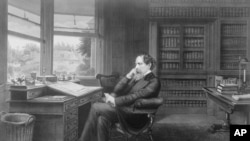This year is the bicentennial of the birth of Charles Dickens, one of the most celebrated novelists in the English language. And unlike other 19th century authors, who have slipped from the public’s consciousness, Dickens still resonates with readers today.
“He is certainly one of the most popular, one of the most ambitious, and one of the best known,” said Pulitzer Prize-winning writer Jane Smiley, the author of the biography Charles Dickens.
That may be why there are literary conferences, film festivals, theatrical performances and even a half-marathon dedicated to Dickens throughout the year, all over the world.
The boy
Difficult boyhood experiences provided much material for Dickens’ books. They also underpinned his compassionate treatment of the poor and downtrodden, a theme found in most of his novels and one that made him an adored storyteller.
Born in 1812 into an English family that always seemed to struggle with financial debt, Dickens worked in a factory as a child, and his father was even sent to a debtor’s prison.
“He talked about the lives of English people as they were being lived rather than historically, and he was really interested in all kinds of social classes,” Smiley said.
Starting with The Posthumous Papers of the Pickwick Club (also known as The Pickwick Papers) in 1836, and ending with the unfinished The Mystery of Edwin Drood in 1870, Dickens churned out 14 major novels, all of which are still in print. He is also known for a body of shorter works, including a series of Christmas stories, one of which-- A Christmas Carol-- is still highlighted in much of the western world each year during the holiday.
Biographer Jane Smiley talks about Dickens:
The celebrity
Dickens was perhaps the first modern artistic “star,” with a degree of celebrity unusual for his time.
“He really captured the imagination of the people of his time and also of the people after his time,” Smiley said. “He was almost the first English novelist to really talk about the urban landscape and to talk about London.”
She adds that Dickens benefitted from the fact that the British literary world began publishing novels serialized in periodicals during his rise, giving his work much wider distribution.
His highly descriptive use of the English language grabbed readers in his time and in ours.
“For the real Dickens lover, it’s the language that is always so appealing,” Smiley said.
The man
The writer had an actor’s flair and was known to dress with a degree of flamboyance. In a culture that placed a high value on dignity and sobriety, he advocated an exuberant enjoyment of life.
Dickens himself was a complex man - at times generous and kind, and at other times imperious and dismissive of those around him.
“So he’s remained a sort-of fascinating character,” said Smiley.
She adds that Dickens had both “a dark side and a light side,” shades of humanity that have made both the writer and his characters universally appealing.




